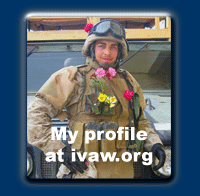I was there today because LCpl Phillip E. Frank, age 20, of Elk Grove Village, Illinois, was shot in a firefight on the Fallujah peninsula on April 8th, 2004. The bullet entered his right armpit through the gap in his body armor. I pulled my humvee with our Civil Affairs team on board to a position of cover near the firefight. Then Frank was loaded onto another humvee in front of us. We raced to Camp Taqadum with an “emergency MEDEVAC convoy” that was half as big as our security SOP dictated. As we went through our local “IED alley” and zig-zagged through barriers on our way to the surgical station, I watched our corpsman furiously work to stop the bleeding and save Frank's life.
When we pulled up the surgical tent, I saw the Marines from the humvee in front of me struggling to open the tailgate that was weighed down by water jugs and gas cans. I ran out and leaned against them to relieve the weight and the tailgate came down. I grabbed the end of the stretcher and passed it off, but because it was broken in the middle, I ended up holding the side to keep it from folding in half. Frank was moaning and fading in and out. His left arm flailed off next to me and I put it back on the stretcher and told him the only thing you can say in that situation: “You made it. You're going to be ok.” But I was wrong. The bullet had severed an artery and lodged against his spine. He died of internal bleeding within minutes. He has earned his place among those 4000 and the pantheon of patriots who died for love of country.
I was also there today for my cousin, Sgt Allen D. Kokesh of Yankton, South Dakota. On December 4th, 2005, his humvee was struck by an IED in Baghdad that killed two other soldiers from his guard unit. He was airlifted out of Iraq and ended up at Brooke Army Medical Center in San Antonio, Texas. He was suffering from inhalation burns, a leg amputation, and numerous other injuries. President Bush himself visited him there while in recovery, and Allen even managed two enthusiastic salutes in the process. But the President's encouragement and blessings were not enough and he passed away on February 7th, 2006. He was 21. The President did not attend his funeral. It would have been his first and only for any soldier. He has also earned his place on the most hallowed of lists.
But these cases are in contrast to those like Sgt James W. McDonald. He also suffered injuries resulting from an IED attack in May of 2007. After extensive surgeries and still suffering from the effects of Traumatic Brain Injury (TBI) he was found dead in his barracks on November 12th. The Army has ruled that it was not suicide and not accidental, but have denied his mother's wishes to have his name placed on the memorial wall at Fort Hood. In it's desperate attempt to deny the costs of war, this administration has denied Sgt McDonald his deserved place of honor.
Among those who will never be counted are those who have committed suicide as a result of their service. Being put in situations that only occur in futile occupations where your morals are at odds with your survival instincts and your survival instincts win, can do that to you. According to CBS News, at least 6,256 took their lives in 2005 alone. Jonathan Shulze killed himself after seeking treatment and being told by the VA to just hang on a little longer; he was “number 26.” Will anyone from this administration even claim a shred of responsibility for these deaths?
I know that this “milestone,” as it is commonly referred to, is essentially meaningless. It doesn't mean anything to the families of one of four men that may have been the actual 4000th casualty. It doesn't mean anything to those who passed before them to be on a longer list. It doesn't mean anything to the administration that lied us into this war. And it doesn't mean anything to the Congress that continues to fund a very costly occupation. But if it means something to the average American who was not even aware that last Wednesday marked the start of our sixth year in Iraq, hopefully it can inspire them to do something about it.


















